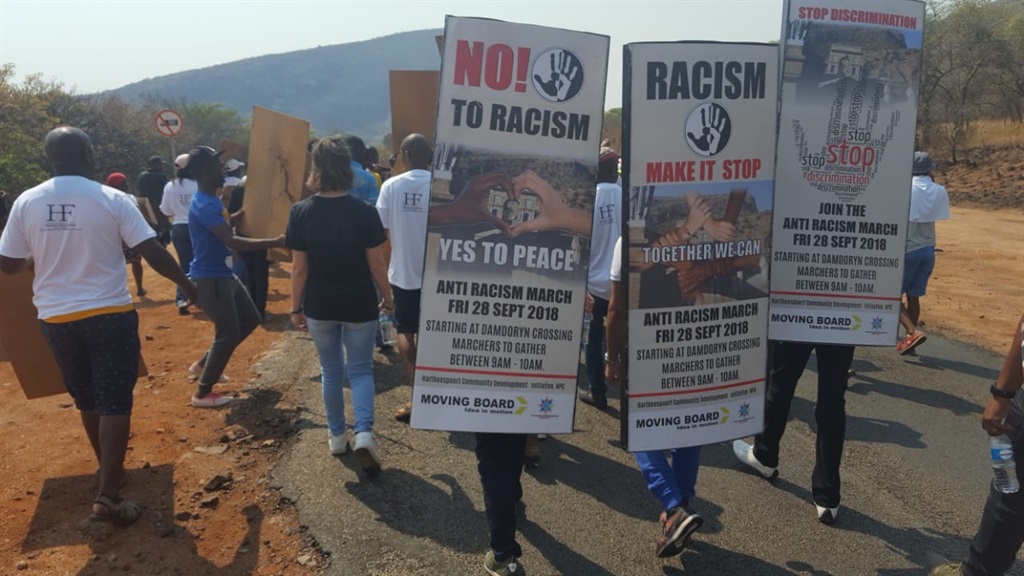
The “racism stops here” day that took place on September 28 at Hartbeesport was a major success. It was peaceful and the memorandum was well received by the government representatives from the presidency and sector departments such as education, labour, water and sanitation, the South African Police Services and the South African Human Rights Commission.
It highlighted the importance of peaceful protests and unity in diversity because it was well attended by the community across all racial groups, confirming the organisers’ commitment to a peaceful, clean, non-violent, non-political and non-racism protest.
Read: ‘They still believe they’re entitled to privilege’: Harties march against racism
The National Development Plan foresees 2030 as the year in which South Africans will be more conscious of the things they have in common than their differences. However judging by the increase in racism incidents reported in the media and the growth in popularity of divisive organisations such as AfriForum and Black First Land First, the prospects of unity in moving together towards a shared future in line with our Constitution that anchors a vision of “South Africa that belongs to all who live in it and united in our diversity” is at risk.
The Constitution and the National Development Plan are well synchronised and speak to each other very well as if they were developed at the same time or immediately after the other, but the reality is that they are almost 16 years apart with the constitution adopted in 1996 and the National Development Plan launched in 2012.
The Constitution and its preamble sets out the need to heal the divisions of the past through affirmation and redress while uniting all South Africans as citizens in the land of their birthright. The National Development Plan recognises that South Africans have made progress since 1994 in uniting the country, yet society remains divided by race among others.
I can also attest to have witnessed and benefited from progress made in many fronts and I have also come to realise that very little, if any, has changed in relation to social cohesion and race relations.
For any attempt to stop racism to succeed it must begin by recognising that the introduction of apartheid legalised and institutionalised racial discrimination.
When Hendrik Verwoerd became prime minister of South Africa in 1959, he introduced the Promotion of Black Self-Government Act. The main objective of this act was to create self-governing homelands. The black population was arranged and categorised based on language and culture.
It had the effect of creating radical separation not only for blacks from the white South African population, but also of black ethnic groups from each other. To this day we still see the effects of this policy.
It is clear that when a clear policy is in place, deliberate and consistent actions are required from all sections and sectors of society towards the desired goals. The fact that racism has been maintained between the adoption of our acclaimed Constitution and the launch of the National Development Plan to this day points to poor and inconsistent actions to end racism. It also exposes the flaws of our Constitution and necessitate the call for racism to stop now.
I had my very own “racism must stop now day” in July, when we faced off with a heavily armed and well organised gang of racists who felt threatened by the presence of a black child in a neighbourhood they considered theirs.
Read: Springs simmers with tension after farmer’s alleged ‘racist’ attack on boy
Before this face-off I never saw racism to be such an issue that deserved special attention in South Africa. But after I shared my experience I was shocked by the number of people who came back to me with their own stories and I just could not believe it – hence my resolve to be an active participant in the Racism Stops Now campaign.
If you are lucky to not have come anywhere close to your very own Racism Stops Here Day be glad and take it from me: racism is well and alive in our society and you do not have to wait for your day to see the need to join the campaign to stop it now. When the day comes you might not survive to tell your story.
Not that the march is over, the real actions to end racism have begun and all hands are on deck.
We expect political formations to lead by example and respect their oath of office by coming out clear against racism in line with the Constitution.
The legislature has a constitutional mandate to exercise oversight over the executive and to hold the president and his Cabinet to account, and it is time for a better explanation on why we have made little progress on race relations since 1996 when we adopted the new Constitution.
Elections are coming up next year. The plan is to encourage all South Africans to vote for political formations with clear commitments and plans to address racism in our country. This will go a long way to isolate racists in our society and giving space for proud South Africans to work together in building our nation towards radical socioeconomic transformation.
Racism must be classified as a serious crime to ensure that racists are jailed and deters others.
The police are often ill prepared to handle racism cases and the Human Rights Commission appears to be incapacitated and selective of cases. This cannot be the case anymore if racism is to stop here.
The 2011 census puts the Hartbeesport population at 22 374. It comprises 13 293 (59.41%) Whites, 8 549 (38.21%)Blacks , 256 (1.14%) coloured and 164 (0.73%) Indians or Asians, making the town an ideal place for radical socioeconomic transformation given the high population of wealthy families who, by now, are familiar with cross subsidisation.
Most residents in this town have already complained that their rates and taxes are used to subsidise others outside the town while informal settlements and poor service delivery is on the increase. This presents an opportunity for the government to avoid another cosmetic transformation usually characterised by just name changing and implement radical socioeconomic transformation that will see local entrepreneurs benefiting from the local economy and having business rights to the Hartbeesport Dam while the community enjoys improved service delivery.
This will go a long way in addressing the greed and entitlement that is evident when unpacking racism in Hartbeesport.
Many people have come forward to congratulate us on the success of the march and asked the question, what is next? We can’t claim to have all the answers to this national question and intend to join and support other peaceful inclusive protests against racism in all corners of our country as we strongly believe that what we started in Hartbeesport is something that must be demonstrated in all towns and cities.
It will be important for all stakeholders to put their differences aside and work together in building united communities while we proceed with follow ups for the government to act on our memorandum as they committed.
In the spirit of intergovernmental relations we expect the presidency to lead society in the fight against racism and their participation in the march by receiving and signing the memorandum has already shown commitment to deal with the problem. We expect to see increased efforts to end racism in our country so that, come 2030, it will notbe necessary for people to be categorised as blacks, whites, coloureds, Indians, but as South Africans.
• Russell Baloyi is spokesperson for the “racism stops here” campaign.




 Publications
Publications
 Partners
Partners








